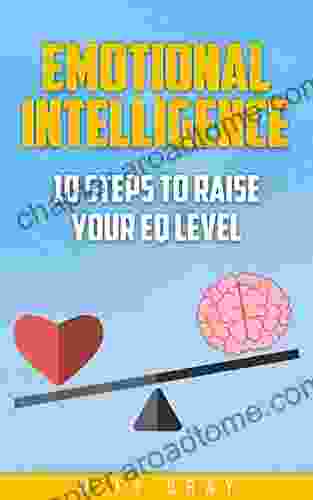Emotional Intelligence 10 Steps To Raise Your EQ Level

Emotional intelligence (EQ) is the ability to understand, use, and manage your own emotions in positive ways to relieve stress, communicate effectively, empathize with others, overcome challenges, and defuse conflict. It is an important skill for success in all areas of life, including personal relationships, work, and school.
4.1 out of 5
| Language | : | English |
| File size | : | 2164 KB |
| Text-to-Speech | : | Enabled |
| Screen Reader | : | Supported |
| Enhanced typesetting | : | Enabled |
| Word Wise | : | Enabled |
| Print length | : | 54 pages |
| Lending | : | Enabled |
There are many different ways to improve your EQ. Here are 10 steps to get you started:
1. Become aware of your emotions
The first step to managing your emotions is to become aware of them. Pay attention to how you feel in different situations and try to identify the triggers that cause you to feel certain emotions. Once you are aware of your emotions, you can start to manage them in a healthy way.
2. Label your emotions
Once you are aware of your emotions, start to label them. This will help you to understand them better and to communicate them to others. For example, instead of saying "I feel bad," you could say "I am feeling sad" or "I am feeling angry." This will help you to identify your emotions more specifically and to understand why you are feeling them.
3. Accept your emotions
It is important to accept your emotions, even the negative ones. Don't try to bottle them up or deny them. Allow yourself to feel your emotions and to experience them fully. Trying to suppress your emotions will only make them stronger.
4. Manage your emotions
Once you have accepted your emotions, you can start to manage them in a healthy way. There are many different ways to do this, such as:
- Talking to someone about your emotions
- Writing in a journal
- Exercising
- Meditating
- Spending time in nature
5. Express your emotions in a healthy way
It is important to express your emotions in a healthy way. This means not bottling them up or taking them out on others. Find healthy ways to express your emotions, such as talking to someone you trust, writing in a journal, or creating art.
6. Build relationships
Building relationships is an important part of emotional intelligence. Strong relationships can provide you with support, encouragement, and feedback. They can also help you to learn from others and to see things from different perspectives.
7. Be empathetic
Empathy is the ability to understand and share the feelings of others. It is an important part of emotional intelligence because it allows you to build relationships, resolve conflicts, and provide support to others.
8. Be assertive
Assertiveness is the ability to express your thoughts and feelings in a clear and direct way. Being assertive can help you to get your needs met and to resolve conflicts. It is important to be assertive without being aggressive.
9. Be adaptable
Life is full of change, and it is important to be adaptable. Being adaptable means being able to change your plans and expectations when necessary. It also means being able to cope with stress and uncertainty.
10. Be mindful
Mindfulness is the practice of being present in the moment. It can help you to become more aware of your thoughts and feelings, and to manage them in a healthy way. There are many different ways to practice mindfulness, such as meditation, yoga, and spending time in nature.
Emotional intelligence is a key skill for success in life. By following these 10 steps, you can raise your EQ level and improve your ability to understand, use, and manage your emotions.
4.1 out of 5
| Language | : | English |
| File size | : | 2164 KB |
| Text-to-Speech | : | Enabled |
| Screen Reader | : | Supported |
| Enhanced typesetting | : | Enabled |
| Word Wise | : | Enabled |
| Print length | : | 54 pages |
| Lending | : | Enabled |
Do you want to contribute by writing guest posts on this blog?
Please contact us and send us a resume of previous articles that you have written.
 Book
Book Novel
Novel Page
Page Chapter
Chapter Text
Text Story
Story Genre
Genre Reader
Reader Library
Library Paperback
Paperback E-book
E-book Magazine
Magazine Newspaper
Newspaper Paragraph
Paragraph Sentence
Sentence Bookmark
Bookmark Shelf
Shelf Glossary
Glossary Bibliography
Bibliography Foreword
Foreword Preface
Preface Synopsis
Synopsis Annotation
Annotation Footnote
Footnote Manuscript
Manuscript Scroll
Scroll Codex
Codex Tome
Tome Bestseller
Bestseller Classics
Classics Library card
Library card Narrative
Narrative Biography
Biography Autobiography
Autobiography Memoir
Memoir Reference
Reference Encyclopedia
Encyclopedia Jane Gilgun
Jane Gilgun Nathan Thomas
Nathan Thomas Nigel West
Nigel West Michael J Hill
Michael J Hill Nate Briggs
Nate Briggs Suman Deb Roy
Suman Deb Roy Nick Pendrell
Nick Pendrell Philip C Almond
Philip C Almond Mikhail Petrunin
Mikhail Petrunin Nathan Nyquist
Nathan Nyquist Susan Stefan
Susan Stefan Nancy Bubel
Nancy Bubel Mike Byrnes And Associates
Mike Byrnes And Associates Jessica Weil
Jessica Weil Michael Herman
Michael Herman R Edward Hendrick
R Edward Hendrick Peter Gorman
Peter Gorman Walt Larimore
Walt Larimore Michael Carlini
Michael Carlini Michael Franzese
Michael Franzese
Light bulbAdvertise smarter! Our strategic ad space ensures maximum exposure. Reserve your spot today!

 Jeff FosterHistorical Dictionary of the Roosevelt-Truman Era: Historical Dictionaries of...
Jeff FosterHistorical Dictionary of the Roosevelt-Truman Era: Historical Dictionaries of... Herbert CoxFollow ·4.1k
Herbert CoxFollow ·4.1k Jeremy MitchellFollow ·15.3k
Jeremy MitchellFollow ·15.3k Hugo CoxFollow ·6k
Hugo CoxFollow ·6k Carl WalkerFollow ·10.3k
Carl WalkerFollow ·10.3k Branson CarterFollow ·3.8k
Branson CarterFollow ·3.8k Roald DahlFollow ·9.6k
Roald DahlFollow ·9.6k Wayne CarterFollow ·10.9k
Wayne CarterFollow ·10.9k Darrell PowellFollow ·11.7k
Darrell PowellFollow ·11.7k

 Samuel Beckett
Samuel BeckettPortrait of the Plague Doctor: A Chilling Tale of Fear...
Prologue: A...

 Elliott Carter
Elliott CarterTrends in Modeling and Simulation Studies in...
Unveiling the Convergence of...

 Natsume Sōseki
Natsume SōsekiCells For Kids: Science For Children
Unlock the Microscopic...

 Anthony Wells
Anthony WellsUnlock the Power of Understanding: Embrace the African...
Embark on a Journey of Truth,...

 Forrest Reed
Forrest ReedBreaking Free: Healing from Toxic Relationships Between...
Are you struggling...
4.1 out of 5
| Language | : | English |
| File size | : | 2164 KB |
| Text-to-Speech | : | Enabled |
| Screen Reader | : | Supported |
| Enhanced typesetting | : | Enabled |
| Word Wise | : | Enabled |
| Print length | : | 54 pages |
| Lending | : | Enabled |












